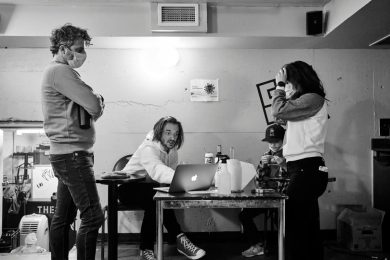Krista Simoneau’s agency has been playing a key role in the industry for a decade now. We met with an influential woman who’s learned how to say “no.”
Les Yeux Boussoles is the name this Laval-based decision-maker picked for the management and production company she founded in 2012. Krista Simoneau didn’t just pop up in the industry as a novice: she studied bass guitar at Cégep Saint-Laurent – which is where she met Louis-Jean Cormier, François Lafontaine, etc. – “but I don’t play anymore,” she says.

Left to right: Louis-Jean Cormier, François Lafontaine, Krista Simoneau. Photo: Le Caron
She then went on to specialize in sound engineering at Cégep de Drummondville before working extensively as a stage tech – “patching stages” as she puts it – most notably for the Montréal International Jazz Festival, as well as the Francofolies. She also worked as an electrical and lighting technician at Salle Pauline-Julien, a venue in Sainte-Geneviève, a suburb in the West end of the island of Montréal.
“That’s the universe I’m from,” she says. “I worked at Spectra, producing shows from 2005 to 2011. Booking agent is not a trade you learn in school.” She actually uses the word “salesperson” to describe her work. “The phone was ringing off the hook at Spectra, all the bookers were on the line and that’s the perfect opportunity to push your emerging artist’s projects. It’s easier that way,” says.
“When I came back from my maternity leave [she’s the mother of an 11-year-old and a 15-year-old, whose father is Louis-Jean Cormier] Catherine Simard was taking the helm of the agency,” says Simoneau. They spent a year working together before she decided to create her own agency. “I needed new challenges, and to define who I am as a human being,” she says.
Now 43, Simoneau has become – thanks to her discretion, rigour, and humility – a player to be reckoned with. She’s honing her skills, while still managing and advising Louis-Jean Cormier, whose career continues to soar to great heights with his incandescent solo albums, his life with Karkwa, his TV appearances as a coach on La Voix [the Québec franchise of The Voice], and as a creative teacher on Star Académie.
“One of the achievements I’m the proudest of is the digital platform Louis-Jean and I have developed: Le 360,”: she says. “It has exclusive content, interviews, guitar lessons, videos with new artists and collaborators, etc. It’s a big project because doing digital and video is expensive, and takes a lot of time in the schedule. We actually film all the capsules in his studio [Dandurand]. We want to showcase his many talents.”
The couple split six years ago. It wasn’t an easy thing to do, considering their business ties. It turned out to be the ultimate test of their resilience. The breakup started getting public attention, and, invoking personal reasons, the musician paused his career. “But I would’ve kept on doing what I do no matter what, because I also manage other artists,” says the woman who skis and jogs in her spare time.

Left to right: Krista Simoneau, Brigitte Poupart (with her back turned), Martin Léon, Louis-Jean Cormier. Photo: Joséphine Trottier-Rivard
Salomé Leclerc, Lou-Adriane Cassidy, country singer Cindy Bédard, Ariane Moffat, Galaxie, Martin Léon, and a new band whose identity she cannot divulge yet, are among the artists that Simoneau and her two valiant employees manage.
“You can’t represent just one artist, because you never know when they’ll leave you, or conflicts will arise,” says Simoneau. “Working with someone with whom you’re romantically involved is also very difficult. We’ve been through it together, because we’re able to talk to each other and untie the knots, even though it’s sometimes really hard. Our communication was a tad more abrasive during the first two years,” she laughs, “but we’ve been separated for six years now, and things couldn’t be better. The crisis is behind us. We’re focused on our future professional projects, not on our quarrels. We appreciate each other deeply. He’s really easy to work with, he’s not a complicated person.”
What does she enjoy the most? “Representing artists I work with, whom I adore, but without acting like a groupie,” says Simoneau. “I like selling their shows to bookers and helping them get discovered, and I think I’m good at it, at placing my pieces. I like long-term strategizing, too: where do we see ourselves a year or two from now?”
Projecting herself into the future, she says, “The promotional and release operation starts a year before the album is slated to come out, and it culminates with the tour, so it’s a three-year commitment.” Where, for example, does she see 24-year-old Lou-Adriane Cassidy – one of Ariane Roy’s dear friends – in the near future?
“I believe she’ll mark her generation just as Louis-Jean did his,” she says. “That woman has what it takes to reach the same level of exposure. She knows exactly where she’s going, she’s got a strong, sensual rock vibe that she totally owns – like Salomé. I think she’ll be a role model for my daughter’s generation, and I totally see her selling-out MTelus no more than three years from now.
“My strategy? The right artist in the right place at the right time. It’s OK sometimes to decide to play more fringe festivals rather than the Francos de Montréal. Waiting for the right moment is sometimes very hard for artists. And then, when things are on a roll, the hardest thing is saying no to certain projects. It’s a common mistake when you start out to say yes to everything. But sometimes, the wise thing to say is ‘We’ll pass on this for now, this opportunity will come around again.’”